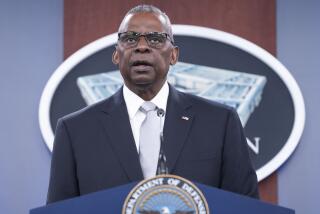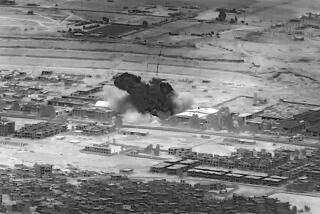Official Says U.S. Is Sobered, Not Subdued
- Share via
BAGHDAD — Visiting Deputy Secretary of State Richard L. Armitage said Saturday that U.S. officials have been sobered by mounting casualties in Iraq but insisted that America will press forward and take the fight to the enemy.
Armitage’s remarks came at the end of the bloodiest week for coalition forces since April.
The day began with the deaths of two U.S. paratroopers with the 82nd Airborne Division, who were killed in a land mine explosion outside the restive city of Fallouja. It ended with a bomb attack on a mounted patrol in Baghdad that killed one soldier from the 1st Armored Division and wounded another.
In addition, mortar shells fell near the Republican Palace complex in central Baghdad, the third such bombardment in two weeks of the headquarters of the U.S.-led Coalition Provisional Authority. There were apparently no injuries.
Citing what it called an unacceptable security threat, the International Committee of the Red Cross announced Saturday that it is closing its offices in Baghdad and Basra. Twelve people died in a suicide car bombing at the Red Cross’ Baghdad headquarters Oct. 27, but the organization said it was unwilling to accept military protection because of its governing policy of neutrality.
The U.S. deaths on Saturday brought to 36 the number of coalition troops killed in the first eight days of November: 35 U.S. soldiers and one Polish major.
Sixteen of the deaths occurred after a Chinook helicopter was shot down near Fallouja on Nov. 2, and six came in the crash Friday of a Black Hawk helicopter near the main U.S. base in Tikrit, Saddam Hussein’s power base.
In response to the latest crash, U.S. F-16 warplanes dropped three 500-pound bombs Saturday near Tikrit and shelled several abandoned houses and structures thought to have provided cover to insurgents. Troops accompanied by Bradley fighting vehicles also swept the area along the Tigris River near where the Black Hawk fell.
“This was a show of force,” said Maj. Gordon Tate, a spokesman for the 4th Infantry Division, headquartered in one of Hussein’s former palaces in Tikrit. “It shows we have the ability to strike back, and it demonstrates our resolve.”
Dropping bombs on an empty landscape as a pure demonstration of power is an unusual tactic, underscoring the military’s fury at the loss of three helicopters in a two-week period. In addition to the Fallouja and Tikrit crashes, a chopper was destroyed by insurgents near Tikrit on Oct. 25 without fatalities.
Investigators have not yet determined what brought down the Black Hawk, although officials have ruled out a ground-to-air missile, such as the one suspected to have taken down the Chinook. Military spokesmen said a rocket-propelled grenade or small-arms fire might have been the cause of the crash, but Tate said mechanical failure had not been ruled out.
Armitage, who is touring several Middle Eastern countries, expressed confidence in the U.S. forces but acknowledged that “it’s not a secret to anyone that in the Baghdad, Tikrit, Ramadi, Fallouja area, we’ve got a security problem. We’re sobered by the problem, but after discussions today ... I am absolutely convinced that we have a very solid plan to go out and get these people who are killing us and killing Iraqis.
“We’re going to take this fight to the enemy.”
In other developments, the coalition announced the arrest Saturday of a suspected former bodyguard of Hussein during a raid near Kirkuk in northern Iraq. Troops also seized weapons and ammunition. The statement said that the military had been tipped that the suspect had been active in attacks against U.S. forces in recent weeks.
Times staff writer Patrick J. McDonnell contributed to this report.
More to Read
Sign up for Essential California
The most important California stories and recommendations in your inbox every morning.
You may occasionally receive promotional content from the Los Angeles Times.













